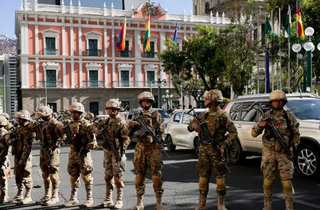President Luis Arce described the situation as a coup attempt but vowed to stand firm, urging citizens to mobilize in defense of democracy.
The crisis unfolded rapidly in the South American nation of 12 million people. Troops initially appeared to take control of the government, but President Arce swiftly named a new army commander, who ordered the soldiers to stand down. Within three hours, the rebellion was quelled as the troops and military vehicles retreated.
Hundreds of Arce's supporters then gathered outside the palace, waving Bolivian flags, singing the national anthem, and cheering the end of the attempted coup. The soldiers' retreat was soon followed by the arrest of army chief Gen. Juan José Zúñiga, after the attorney general opened an investigation into the events.
Government Minister Eduardo del Castillo announced that in addition to Zúñiga, former navy Vice Adm. Juan Arnez Salvador was also taken into custody. "What was this group’s goal? The goal was to overturn the democratically elected authority," del Castillo told journalists.
By late Wednesday, Defense Minister Edmundo Novillo declared that "everything is now under control." Surrounded by the newly appointed military chiefs, Novillo stated that Bolivia had experienced a "failed coup."
This coup attempt came amid ongoing tensions and political infighting between President Arce and his former ally, ex-president Evo Morales, over control of the ruling party. The country is also grappling with a severe economic crisis, adding to the political instability.
As Bolivia recovers from the events of the day, the government remains vigilant, emphasizing the need to uphold democratic principles and maintain stability in the face of internal and external challenges. (ILKHA)



 Dünya
Dünya
 Dünya
Dünya
 Güncel
Güncel
 Dünya
Dünya
 Dünya
Dünya
 Dünya
Dünya
 Dünya
Dünya
 Dünya
Dünya
 Güncel
Güncel
 Güncel
Güncel





